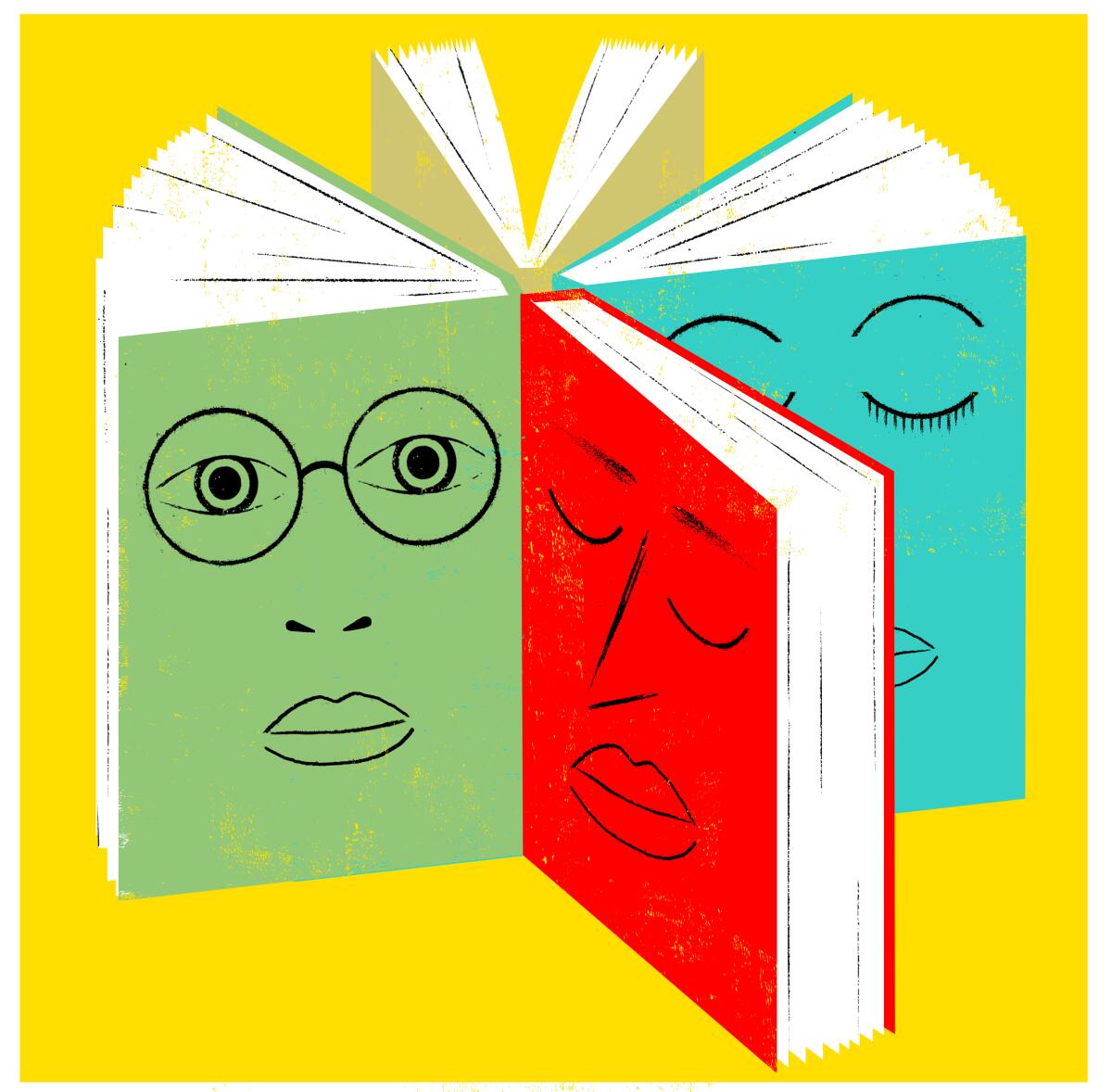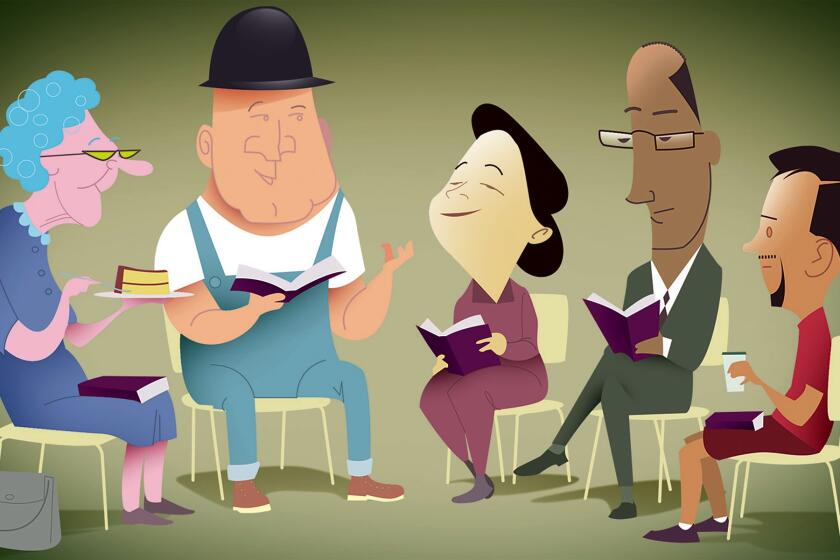A place where reading is the cure

- Share via
Anton Chekhov’s short story “The Student,” said to be the master’s favorite, is today’s reading selection for the Aphasia Book Club.
Aphasia Book Club, you ask? It sounds improbable. Five years ago when I first read a notice for the group, which meets weekly at the Echo Park Branch of the Los Angeles Public Library, I thought it must be a misprint, even a joke. Like many others, I mistakenly assumed that difficulty in speaking or reading implied a deficit in intellectual acuity. It’s not true.
Aphasia is a language problem. It’s a condition, but a treatable condition. Literally meaning “without speech,” aphasia, as defined succinctly by neurologist Antonio Damasio, is “a breakdown of the two-way translation that establishes a correspondence between thoughts and languages.” Most often the injuries to the brain are the result of strokes or aneurysms.
“You’ll never find more motivated readers than those who can no longer take reading, or the ability to discuss what they’ve read, for granted,” says public services librarian Francie Schwarz.
Schwarz cofounded the book club in 2013 with husband Mike Biel, a speech pathologist who teaches at Cal State Northridge. Their research indicates the group may be the first aphasia book club at a public library in North America.
In Los Angeles County, 25,000 to 30,000 people suffer from aphasia, Biel says, but there is little support after they leave the hospital. “When you have a communication problem, it’s hard to advocate for yourself,” he says. The isolation can be devastating.
For the 10 to 12 participants who come together every week to discuss a work of literature, the Aphasia Book Club is a lifeline. The readers, who range in age from early 30s to 90, are more than a year out from their initial injury, what’s called the chronic stage of aphasia.
They work to improve their language skills — reading, writing, speaking, comprehension — with spirited discussions of challenging books such as Marilynne Robinson’s “Housekeeping,” Flannery O’Connor’s “A Late Encounter with the Enemy,” and Vladimir Nabokov’s “Lolita.” Some discover the book club online; some through the Aphasia Support Group at Cedars-Sinai; others are referred by therapists.
In this friendly and determined community of readers, I find a welcome refuge from the daily barrage of emails, texts, sped-up multitasking urban reality. When I join the group, I practice listening, not racing ahead. As the British writer Deborah Levy noted in a recent memoir: “It is always the struggle to find language that tells me it is alive, vital, of great importance.” What gets communicated in this humble room is usually worth the wait.
Among those around the table today are Uma Nithipalan, a native of Sri Lanka who was an aspiring actor when she suffered her stroke at 27, 11 years ago. She announces she’s just become a U.S. citizen. “Before my injury,” I didn’t care,” she tells the group, “but now I’m awake about voting.” Everyone cheers.
Join our community book club. Our mission is to get Southern California reading and talking.
There’s Phong Pham, in his early 30s — his aneurysm was six years ago. He emigrated from Vietnam when he was 5. “For one year, I knew no language.” Now he’s had to learn English a second time.
Dale Benson, a former entertainment industry professional, is seven years out from his stroke. He often references his traumatic years as a Navy SEAL: “When I came back from Vietnam. Words came at me.”
Larry Arrick was a theater director and teacher. “I don’t like joining anything,” he says with charming gruffness, “but this is a special place.”
Trice Barto was a reality TV producer. Her stroke three years ago left her paralyzed. “I was a mess. I couldn’t talk. My whole left side dead. But now look at me,” she says, beaming. Jeff Krol was injured years ago in a water skiing accident. “I know what’s going on,” he says, “but talking is hard.”
Susan Swan, who taught yoga for more than 20 years, was demonstrating an asana in front of a class nine years ago when she was felled by her stroke. Soon afterward, a friend came to visit her in the hospital. “He sat on the edge of my bed and kept chattering,” she told me, “ ’What are you going to do? What are you going to do?’ ”
She looked at him and answered: “I’m going to go on.”
That’s what people here do. They go on.
Chekhov’s stories, with their brevity and unerring descriptions of human foibles, are a good fit for the group. Barto loves the stories because they are “so clean” they’re “not turning somersaults.” Krol likes them because they “aren’t black and white,” and Nithipalan likes them because “It’s today and it’s a long time ago.”
“The Student” follows a startling arc from despair to an epiphany of joy in three short pages. When I first read the story, I wondered if a page were missing. The story felt truncated. But when we listen together as a group to the audio version, the story peels like an onion.
The Long Beach Book Club Project unexpectedly discovered groups in every corner of the city.
Set somewhere in the Russian provinces on a bleak evening, the story introduces a student studying for the priesthood who treks home from a hunt. The weather is ghastly. He’s hungry. There’s no food at home. En route, he encounters two widowed working women, a mother and daughter and joins them around their fire on the eve of Good Friday.
The student’s worldview abruptly changes from what transpires during the encounter; “joy fills his soul.” The outside world may be cold, dark, miserable — but a great story can reach across the millennia and still move us. “The past is linked with the present,” he realizes, “by an unbroken chain of events flowing one out of another. And it seemed to him that he had just seen both ends of that chain; that when he touched one end, the other quivered.”
Does this make you feel more hopeful?” Schwarz asks the group. We look to Arrick, our resident philosopher. It takes a while for him to find the words; but no one’s in a hurry.
“The end of the story makes the women cry,” Arrick says. “And that’s a very positive thing. People can still feel.”
There’s collective agreement, nodding around the table. Together, we’re feeling the power of Chekhov’s story, which is, as Swan notes with admiration: “Such gritty, teeth-worthy substance.”
Steinman founded the Aloud lecture series at the Los Angeles Public Library and curated it for 25 years. She is the author of “The Souvenir: A Daughter Discovers Her Father’s War.”
For more information: contact the Echo Park Branch library: (213) 250-7808, or visit lapl.org/whats-on/events/aphasia-book-club-echo-park.
More to Read
Sign up for our Book Club newsletter
Get the latest news, events and more from the Los Angeles Times Book Club, and help us get L.A. reading and talking.
You may occasionally receive promotional content from the Los Angeles Times.







